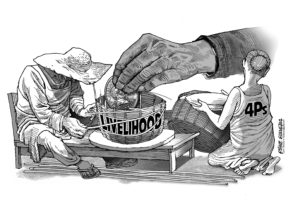
While beneficiaries of the Pamilyang Pantawid Pilipino Program (4Ps) will likely denounce Agriculture Secretary Manny Piñol’s position to abolish the program in favor of livelihood projects, not a few people would likely agree and even lobby for its abolition in Congress.
And Piñol’s view, however, skewed it may be against the poor, isn’t solitary as an increasing number of people in countries classified as First World have always debated the dole out programs implemented by their government as it always results in substantial income and corporate taxes.
In those countries dole outs come through food and clothing stamps which can sustain the unemployed until they can secure a job. Here in the Philippines it comes in the form of cash transfers both conditional and unconditional.
The conditional part requires beneficiaries to be the poorest of the poor and their compliance with sending their children, if any, to schools. The unconditional cash transfer was intended to cushion the effects of the TRAIN law which would likely be institutionalized unless Congress gets persuaded to suspend it temporarily.
Piñol’s argument does have its valid points: for one, he argued that the families have become quite dependent on the cash transfers and had used their 4Ps cards as guarantee for payment of their loans. Then there are stories, which may be more than rumor, that beneficiaries use the cash to pay for their drinking or worse, drugs.
He does have a point that government should allocate a similar P70 billion budget for livelihood equal to the 4Ps budget. But like the 4Ps program, livelihood projects are also exploited by incumbent officials to advance their political profiles ahead of the elections.
But if that’s the case, then the previous Aquino administration which inherited the program from its predecessor shouldn’t have continued with it. Instead it chose to allocate a bigger budget and even expanded its implementation as it saw that it helped a lot of beneficiaries.
Nobody likes to give money away especially to freeloaders who have the gall to demand for it without any corresponding accountability on their part. And not everyone can avail of livelihood assistance if they don’t have the capability to sustain it due to handicaps or other factors.
If livelihood is pursued aggressively, it should be done in cooperation with companies who can benefit from it as well.
Cooperatives are key to setting up, building and sustaining livelihood among communities who need not be reliant on cash dole outs to support themselves forever. Both assistance and livelihood can coexist provided that all stakeholders are involved to sustain it.